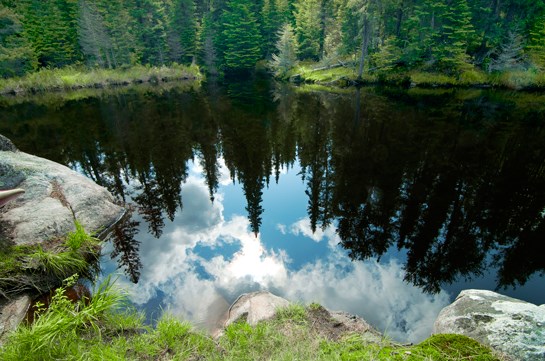Representatives of First Nations, government, northern communities and conservation groups gathered at the Kikiwak Inn on Opaskwayak Cree Nation (OCN) Feb. 17 to discuss future plans and aspirations for the boreal forest that covers 80 per cent of Manitoba.
Items up for discussion included methods of obtaining scientific data and other local knowledge and information; co-ordinating existing and future plans, policies and initiatives; collaborating to balance economic prosperity and northern jobs with environmental health; addressing issues related to endangered species, ecological goods and services and changing water management; and adapting to the impacts of and risks posed by climate change.
“To create a broad and well-balanced approach to the boreal region, we need to combine the strengths of traditional ecological knowledge, scientific research, integrated planning, data gathering and monitoring,” said Gord Mackintosh, conservation and water stewardship minister for the provincial government, which organized the summit. “We look forward to the boreal summit where so many views and ideas will be brought together to contribute to the future of our province.”
Support for boreal forest conservation is strong in Manitoba, according to a survey conducted for the International Institute for Sustainable Development (IISD) by Probe Research Jan. 14-27 with a sample of over 1,000 Manitobans. The survey found that 88 per cent of respondents wanted half of the boreal forest protected and 63 per cent felt more than half should be protected. The importance of conservation was highlighted by the fact that 34 per cent of survey respondents thought conservation should be the highest priority for the boreal forest while only three per cent thought that development should be the highest priority. Four-fifths of respondents said that companies operating in the boreal forest should be required to share resources extracted from traditional lands with aboriginal residents.
Curtis Brown, Probe Research vice-president, said support for balancing conservation and development existed across the political spectrum.
“While some debate might be expected between those who want broader conservation and those who want more development, according to Probe’s analysis, the debate is only between those who want to see half of the region protected and those who want more than half protected.”
“The Canadian boreal is the world’s largest remaining intact terrestrial ecosystem,” said Dr. Hank Venema, chief scientist at IISD, “Manitoba has a big piece of it and it is really only now coming under pressure from development. Manitobans want to see their economy and communities prosper, but want it done in a way that is respectful of the land and the people who live on it. We have in this province a unique opportunity to look forward, to strive for—and achieve—the right balance between development and conservation. To get things right where in many other places it has gone wrong.”
That indicates that efforts to implement principles in the Boreal Forest Conservation Framework are broadly supported, said Venema.
“The framework calls for landscape scale planning in partnership with indigenous communities to protect at least half of the boreal, and provide world-class standards for sustainable development on the remainder,” said Venema. “Quebec and Ontario have already adopted many of the principles of the framework, but nowhere has the public support for this approach been as high as we’re seeing here in Manitoba—and across party lines. It’s very encouraging to see that Manitobans strongly favour taking the long view and embracing conservation and sustainable development for such a large and important part of the province.”
Chief Ron Evans of Norway House Cree Nation said he was happy the government is taking First Nations perspectives into account when it comes to boreal forest development and conservation.
“I am pleased to see the inclusion of aboriginal and First Nation participants in this summit,” Evans said. “It is important that we share our teachings, values, knowledge and experiences, all of which are critical to the protection and sustainability of our lands, waters and resources.”
Ron Thiessen, executive director of the Manitoba chapter of the Canadian Parks and Wilderness Society (CPAWS), which said recently, along with Ducks Unlimited Canada, that 2015 could be a good year for Canada’s boreal forest, said the summit was one step towards seeing that prediction come true.
“Manitoba is envied around the world for having a canvas that we can paint with a balance of sustainable developments and a wholesome environment,” said Thiessen on the organization’s website. “In many jurisdictions, the brushes have splattered their entire landscapes with piecemeal developments and now they are trying to restore a healthy balance, which is extremely challenging and expensive. It’s clear we are ready to design a plan for maintaining our wildlife populations and ecological services such as fresh water and clean air in tandem with business investment, partnerships, and employment that are so good for the economy. Everyone in Manitoba would benefit. It is our good fortune that we have the opportunity to plan for a future founded on principles of responsible land use and protection.”
The province announced in a Feb. 18 news release that it had signed a 20-year joint management agreement with OCN to ensure land-use and natural resource management in OCN’s traditional territory would continue to be a cooperative effort between the First Nation and the government.
“This agreement was born from the tireless work of the late conservation minister Oscar Lathlin, whose passion and commitment to working with the people of the north and First Nations communities will never be forgotten,” said Aboriginal and Northern Affairs Minister Eric Robinson. “This partnership ensures everyone with a stake in this important region is involved in the decisions that affect us all.”
“The 20-year joint management agreement strengthens OCN’s inherent ties to the land, giving recognition to the importance of working together with the province of Manitoba,” said OCN Chief Michael Constant. “OCN is committed to the sustainable management of all natural resources in its traditional territories.”




